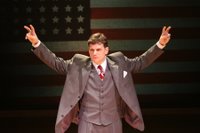REVIEW: Little Willy
 Right: Mark Kassen (sans moustache) as William Patrick Hitler. (Photo: Monique Carboni. )
Right: Mark Kassen (sans moustache) as William Patrick Hitler. (Photo: Monique Carboni. )
Little Willy
by Mark Kassen
Presented by Rude Mechanicals at the Ohio Theatre
Have you heard the one about the Irish Hitler? The punchline to that odd setup is the existence of one William Patrick Hitler, the son of the Fuhrer’s half-brother, who indeed married an Irish woman. So if you walk into the Ohio Theatre and see a man calling himself Hitler, with a different kind of mustache, and speaking in a Lucky Charms brogue... that’s why.
Actually the real reason is that actor-playwright Mark Kassen has fashioned a play about this historical footnote of a man. Unfortunately, his Little Willy never gets more intriguing than those first delightfully estranging moments of being faced with this goofy, ineffectual, oddly-accented wimp of a Hitler. What follows are disparate fragments of a sorry life. Back in the Vaterland, we see him as literally a car salesman—Volkswagens, of course. (Apparently that’s the best Uncle Adolf could do for him.) When things get bad by WWII-time, Willy and mom escape to England (Kassen does not make the reasons clear, unfortunately) and then onto the land of opportunity, where he tries to cash in on his infamous name on the lecture circuit, to no avail.
The facts themselves are plenty intriguing. So why is Kassen’s play so boring? (Even at only one hour long.) Part of the problem is form. Conceived of as basically a one-man show for Kassen to perform, we mostly only get Willy’s own deluded (inflated) point of view, rather than the distance that would make him an enigma. What’s fascinating about his story (to me, at least) is how a man named Hitler interacted with the world at large—not just what he thought of himself. As for these thoughts, Kassen has written monologue after monologue (usually framed as Willy’s sales pitches or lectures) basically repeating the same themes of confidence and salesmanship. The point is, we soon gather, that Willy Hitler is ironically just trying to live the American Dream—not the dream of working hard for reward, but of profiting off your own nefarious and negligible celebrity. The lens of the play is not that of high-minded political satire, but of our own tabloid-obsessed times. A parable less pertinent to the rise of Hitler than the age of Hilton. (Paris, that is.)
Kassen’s only other interlocutor on stage is Roxanna Hope, playing a bevy of sex objects pursued by Willy, with as much letdown as the rest of his life. So when he’s not lecturing he’s awkwardly seducing (and even more awkwardly shtupping). Is this all Kassen could do with his source material? Was the imperative to cut down the cast size so great? The fine production (directed by John Gould Rubin) does splurge for extensive use of video projection, which makes a great contribution, but at the expense of the play. The frequent interjections, for example, of excerpts from a long letter the real Willy actually sent FDR offering his services to the US war effort, hold more fascination than Kassen the playwright can muster in his paraphrases of Willy’s psyche. Such material make me wonder if Kassen would have been better off taking a strictly documentary approach.
Some projected postscript titles on this back wall screen end up literally upstaging everything that has passed before. In telling us the usual cinematic “where did they end up” info, they mention that Willy’s three sons are still alive in Long Island, and have promised never to have children! (So as not to continue the Hitler name.) For everyone I know who has seen the show, this is the only thing they talk about. Kassen has picked a story where the bare facts alone are hard to compete with. It would take a more skillful playwright to construct an equally satisfying fiction.







No comments:
Post a Comment